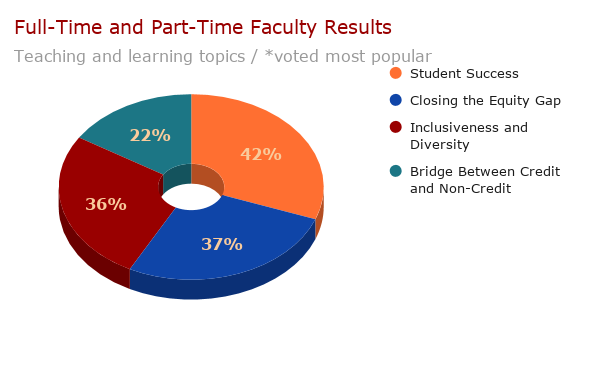City College faculty ranked student success, inclusiveness and diversity, and closing the equity gap as the top three areas of development needed in the 2019-2020 academic year in the recent Annual Needs Survey.
The survey serves to highlight aspects of the college that could be improved upon, including teaching and learning, professional development, and leadership and people skills.
“The intent of the survey is to obtain ideas and feedback from the college community about potential training for SBCC employees and students,” said Marcia Wade, interim vice president of Human Resources.
This survey comes at a time of ongoing racial tension, along with another survey showing the lack of trust between employees and the administration.
Of the full-time and part-time faculty, staff, administration and others the survey was sent to, 232 responded, with the majority of responses being from full-time faculty and staff. Ranked from most to least important, the submissions were grouped by the primary employee group.
Teaching and learning was rated as the top area for improvement among faculty and staff.
Cultural competency, conflict resolution and effective communication ranked the highest in the people skills category.
Personally defined, Wade states that cultural competency is, “providing more resources so that students are able to interact and engage with representative groups of people like themselves within our college community of faculty, staff, management and their fellow students.”
As cultural competency ranks high on the list of the people skills topic, the Professional Development Advisory Committee agreed to collaborate with the LEARN committee to strategize ways to make anti-racism training accessible to all employees.
The LEARN program, an acronym for Leaders in Equity, Anti-Racism, and Reparations Now are responsible for implementing anti-racism training and evaluations on campus.
“I’m very committed to this kind of training,” said coordinator of Faculty Professional Development Dr. Elizabeth Imhof. “We’re looking to produce another round of Crossroads.”
An organization aiming to dismantle structural racism, Crossroads has offered countless faculty and staff extensive anti-racism training programs in response to the conflict surrounding racial insensitivity.
The critical cultural competency workshop applies self-reflection and delves into the deep roots of institutional racism and how to address it.
Like Imhof, Wade expressed confidence in the progression of the college.
“The survey will be used to continue to refine and develop training opportunities and options that will best promote and assist our college community to achieve its mission for student success and to make this institution a safe learning environment.”









